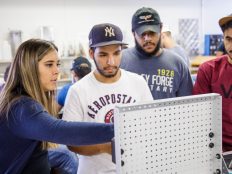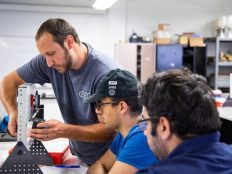Prospective Graduate Students
If you're considering one of our graduate programs, we have more information about becoming a graduate student.Contact the School of Informatics, Computing, and Cyber Systems
What is Electrical Engineering?
Electrical engineering is a branch of engineering, and dates back to the late 19 th century. Since its early beginnings, the field of electrical engineering has significantly changed the human life by creating many new technologies ranging from developing electricity generation and transmission, new communication technologies such as internet and cellular communications to developing new devices such as computers, smart phones, smart appliances or new medical technologies from huge magnetic resonance imaging (MRI) devices to small health monitoring sensors. Electrical engineering covers a broad range of areas such as electronic design, communications, control and robotics, remote sensing, signal processing, digital circuits, instrumentation, audio, video, optoelectronics, power electronics, motors, batteries, renewable energy, and power systems. Electrical engineers work on a wide range of components, devices and systems, from tiny microchips to huge power plants. Some of the pioneers in electrical engineering are Thomas Edison (electric light bulb), Nikola Tesla (induction motor), Guglielmo Marconi (radio), Jack Kilby (integrated circuit), Philo T. Farnsworth (television), Martin Cooper (inventor of cell phone), and Claude Shannon (father of Information theory).
The Electrical Engineering research groups at NAU studies cutting-edge wireless communications and networking, embedded systems, and wireless sensor/actuator networks, autonomous unmanned aerial vehicles, remote health monitoring, cybersecurity, cyber- physical systems, safe autonomous systems, wearable computing, therapeutic robotics, brain- computer interfaces, mixed-signal microelectronics, wind and photovoltaic energy, smart energy systems, high power converters, motors and controllers, electric vehicles, and model predictive control.
If you are interested in exploring new and innovative applications of electrical engineering, we invite you to come join us! To learn more about our research labs, faculty and research staff, research and funding opportunities, and our undergraduate programs, check out the people and projects profiled here, or contact any of our faculty directly with your questions.


